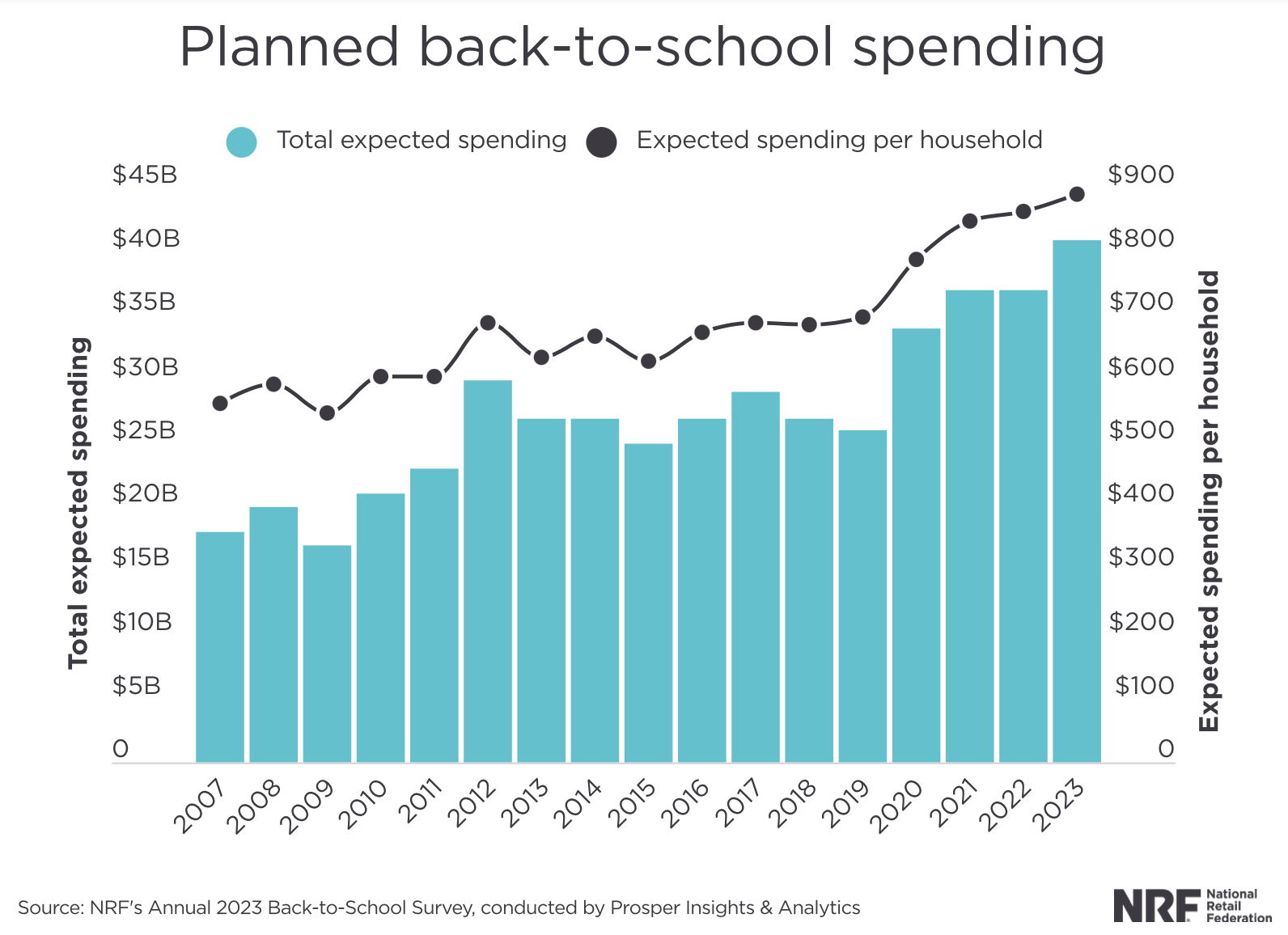Five Ways to Save on Back-to-School Shopping
Make a budget and stick to it when spending on your kids' back-to-school supplies.

Ben Demers

Profit and prosper with the best of Kiplinger's advice on investing, taxes, retirement, personal finance and much more. Delivered daily. Enter your email in the box and click Sign Me Up.
You are now subscribed
Your newsletter sign-up was successful
Want to add more newsletters?

Delivered daily
Kiplinger Today
Profit and prosper with the best of Kiplinger's advice on investing, taxes, retirement, personal finance and much more delivered daily. Smart money moves start here.

Sent five days a week
Kiplinger A Step Ahead
Get practical help to make better financial decisions in your everyday life, from spending to savings on top deals.

Delivered daily
Kiplinger Closing Bell
Get today's biggest financial and investing headlines delivered to your inbox every day the U.S. stock market is open.

Sent twice a week
Kiplinger Adviser Intel
Financial pros across the country share best practices and fresh tactics to preserve and grow your wealth.

Delivered weekly
Kiplinger Tax Tips
Trim your federal and state tax bills with practical tax-planning and tax-cutting strategies.

Sent twice a week
Kiplinger Retirement Tips
Your twice-a-week guide to planning and enjoying a financially secure and richly rewarding retirement

Sent bimonthly.
Kiplinger Adviser Angle
Insights for advisers, wealth managers and other financial professionals.

Sent twice a week
Kiplinger Investing Weekly
Your twice-a-week roundup of promising stocks, funds, companies and industries you should consider, ones you should avoid, and why.

Sent weekly for six weeks
Kiplinger Invest for Retirement
Your step-by-step six-part series on how to invest for retirement, from devising a successful strategy to exactly which investments to choose.
With back-to-school shopping season in full swing, concerns on how to afford clothing and educational supplies are increasing, especially as core inflation remains stubbornly elevated. Back-to-school consumer spending is expected to reach a record $41.5 billion, up from $36.9 billion last year, according to the National Retail Federation's (NRF) latest Back-to-School Survey. The average family with children in grades K-12 will spend about $890 on apparel, shoes, supplies and electronics, surpassing the previous high of $864.
NRF reports that the spending boost is largely driven by increased electronics demand. A record 69% of back-to-school shoppers plan to buy electronics or computer accessories this year, a 4% increase from 2022.

With ever-rising costs weighing on family budgets, here are some tips to save at this pricey time of year:
From just $107.88 $24.99 for Kiplinger Personal Finance
Become a smarter, better informed investor. Subscribe from just $107.88 $24.99, plus get up to 4 Special Issues

Sign up for Kiplinger’s Free Newsletters
Profit and prosper with the best of expert advice on investing, taxes, retirement, personal finance and more - straight to your e-mail.
Profit and prosper with the best of expert advice - straight to your e-mail.
1) Purge the Closet
Kids grow like weeds. A pair of shoes bought just a month ago might no longer fit. Rummage through clothing to see what fits and what is in good condition. Hang onto what you can to pass on to younger siblings, friends or Goodwill. Everything else can be tossed or recycled for a craft project. Talk to your children to make decisions about what they could reuse. This encourages a youngster to think creatively about how to make things last and not waste.
For supplies, look at what the child has from the previous school year. Do you have unused glue, paper and folders that are in good shape? Reuse them or, if there is another child in the household, give them the materials.
2) Make a Budget
Kids need limits, especially financial limits. Sit down with a child and discuss how much can be spent on clothing, supplies and miscellaneous items such as a laptop or high-tech gadget for class. Ask the child to come up with ways to stretch a buck or contribute to the fund.
If the child is older and wants an expensive pair of shoes, offer to pay for half and have him or her come up with the rest. This kind of conversation can be part of a bigger push to teach kids good money habits. An extra benefit: This gives them practice to earn that A in math.
3) Hit the Thrift Stores
Kids today love a good "throwback" and enjoy finding cool retro items from Goodwill stores or rummage sales. Perhaps as guardian or parent, you may have some items in storage that would appeal to the kids in the household. Grandpa's vintage jean jacket from 1960 might look awesome to a teen on the first day of school.
4) Check Online and on Social Media
Surf the web with your child and see if stores such as Target, Walmart, Office Max, etc. are offering deals via their Twitter, Facebook, Instagram or other social media accounts. Many stores post on upcoming sales targeting back-to-school shoppers. Also look up sites such as Amazon.com or Overstock.com for cheaper versions of higher-end items. Consider it virtual rummage sale shopping.
5) Next Year, Start Early
Back to school time is a rush of papers, book bags and clothing flying off the racks and shelves. Next year, think about starting shopping around March and buying certain items such as winter clothing ahead of time when they're on clearance. While everyone else is thinking spring, you will be a savvy shopper thinking about scoring a decent deal on boots for someone in the family.
Related Content
- Back-to-School and 4 Other Florida Tax Holidays Happening Now
- 11 Things You Don’t Need for College
- Virginia Tax-Free Weekend Gone Despite Massive Budget Surplus
Profit and prosper with the best of Kiplinger's advice on investing, taxes, retirement, personal finance and much more. Delivered daily. Enter your email in the box and click Sign Me Up.

Marguerita M. Cheng is the Chief Executive Officer at Blue Ocean Global Wealth. She is a CFP® professional, a Chartered Retirement Planning Counselor℠ and a Retirement Income Certified Professional. She helps educate the public, policymakers and media about the benefits of competent, ethical financial planning.
- Ben DemersAudience Engagement Manager, Kiplinger.com
-
 5 Vince Lombardi Quotes Retirees Should Live By
5 Vince Lombardi Quotes Retirees Should Live ByThe iconic football coach's philosophy can help retirees win at the game of life.
-
 The $200,000 Olympic 'Pension' is a Retirement Game-Changer for Team USA
The $200,000 Olympic 'Pension' is a Retirement Game-Changer for Team USAThe donation by financier Ross Stevens is meant to be a "retirement program" for Team USA Olympic and Paralympic athletes.
-
 10 Cheapest Places to Live in Colorado
10 Cheapest Places to Live in ColoradoProperty Tax Looking for a cozy cabin near the slopes? These Colorado counties combine reasonable house prices with the state's lowest property tax bills.
-
 This Is How You Can Land a Job You'll Love
This Is How You Can Land a Job You'll Love"Work How You Are Wired" leads job seekers on a journey of self-discovery that could help them snag the job of their dreams.
-
 Have You Aligned Your Tax Strategy With These 5 OBBBA Changes?
Have You Aligned Your Tax Strategy With These 5 OBBBA Changes?Individuals and businesses should work closely with their financial advisers to refine tax strategies this season in light of these five OBBBA changes.
-
 A Financial Plan Is a Living Document: Is Yours Still Breathing?
A Financial Plan Is a Living Document: Is Yours Still Breathing?If you've made a financial plan, congratulations, but have you reviewed it recently? Here are six reasons why your plan needs regular TLC.
-
 Your Guide to Financial Stability as a Military Spouse, Courtesy of a Financial Planner
Your Guide to Financial Stability as a Military Spouse, Courtesy of a Financial PlannerThese practical resources and benefits can help military spouses with managing a budget, tax and retirement planning, as well as supporting their own career
-
 3 Steps to Keep Your Digital Data Safe, Courtesy of a Financial Planner
3 Steps to Keep Your Digital Data Safe, Courtesy of a Financial PlannerAs data breaches and cyberattacks increase, it's vital to maintain good data hygiene and reduce your personal information footprint. Find out how.
-
 Here's Why You Can Afford to Ignore College Sticker Prices
Here's Why You Can Afford to Ignore College Sticker PricesCollege tuition fees can seem prohibitive, but don't let advertised prices stop you from applying. Instead, focus on net costs after grants and scholarships.
-
 'You Owe Me a Refund': Readers Report Challenging Their Attorneys' Bills
'You Owe Me a Refund': Readers Report Challenging Their Attorneys' BillsThe article about lawyers billing clients for hours of work that AI did in seconds generated quite a response. One law firm even called a staff meeting.
-
 Divide and Conquer: Your Annual Financial Plan Made Easy, Courtesy of a Financial Adviser
Divide and Conquer: Your Annual Financial Plan Made Easy, Courtesy of a Financial AdviserOverwhelmed by your financial to-do list? Split it into four quarters and assign each one goals that connect to the time of year. It could be life-changing.